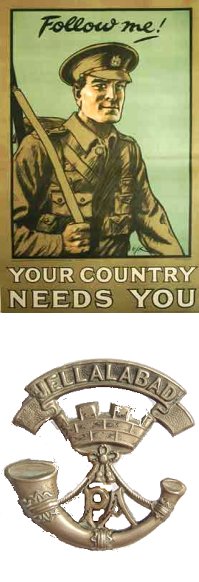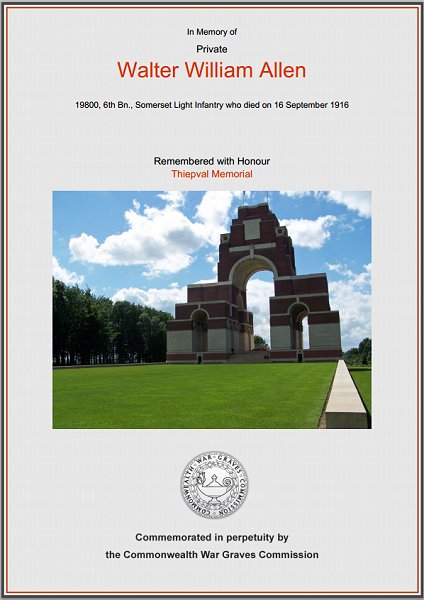yeovil at War
Walter william allen
Killed in action during the Somme Offensive
Walter William Allen was born in Yeovil in 1878, the son of glove cutter James Gard Allen (1833-1903) and Mary née Ryall (b 1837). In the 1881 census James and Mary together with their five children, of whom three-year-old William was the youngest, were recorded living in New Town. The 1891 census recorded the family at 47 Kiddles Lane (today's Eastland Road), New Town, which was repeated in the 1901 Census. By this time however Walter, aged 23, was the only one of the children living at home with his parents, by now in their mid-sixties. Walter listed his occupation as a leather slaker.
In the summer of 1904 Walter married Sarah Ann Haine, of Odcombe, at Sherborne. They were to have two children; Rosina born 1907 and William born 1908. A third child died in infancy. The 1911 census recorded the family living at 60 Kiddles Lane.
 During
1915 Walter
enlisted in the
Army at Yeovil.
He became a
Private (Serial
No 19800) in the
6th Battalion,
Prince Albert's
(Somerset Light
Infantry).
During
1915 Walter
enlisted in the
Army at Yeovil.
He became a
Private (Serial
No 19800) in the
6th Battalion,
Prince Albert's
(Somerset Light
Infantry).
The 6th Battalion had been formed at Taunton in August 1914, becoming part of the 43rd Brigade, 14th Division at Aldershot later that year. On 21 May 1915 the 6th Battalion landed at Boulogne, France, and was involved in extensive fighting from that point onwards.
Walter fought with the 6th Battalion throughout the latter part of 1915 and the first half of 1916. In the summer of 1916 the Battalion was involved in the Battle of the Somme, including the Battle of Delville Wood.
On 1 July 1916, supported by a French attack to the south, thirteen divisions of Commonwealth forces launched an offensive on a line from north of Gommecourt to Maricourt. Despite a preliminary bombardment lasting seven days, the German defences were barely touched and the attack met unexpectedly fierce resistance. Losses were catastrophic and with only minimal advances on the southern flank, the initial attack was a failure. In the following weeks, huge resources of manpower and equipment were deployed in an attempt to exploit the modest successes of the first day.
However, the German Army resisted tenaciously and repeated attacks and counter attacks meant a major battle for every village, copse and farmhouse gained. The Battle of Delville Wood, fought between 14 July and 3 September, was an engagement in the 1916 Battle of the Somme in which the 6th Battalion, Somerset Light Infantry, was deeply involved. Delville Wood is to the north east of the town of Longueval in the département of the Somme in northern France.
After the two weeks of carnage from the commencement of the Somme Offensive, it became clear that a breakthrough of either the Allied or German line was most unlikely and the offensive had evolved to the capture of small prominent towns, woods or features which offered either side tactical advantages from which to direct artillery fire or to launch further attacks.
Delville Wood was one such feature, making it important to German and Allied forces. As part of a large offensive starting on 14 July, General Douglas Haig, Commander of the British Expeditionary Force, intended to secure the British right flank, while the centre advanced to capture the higher lying areas of High Wood in the centre of his line. Delville Wood was a battle to secure this right flank. The battle achieved this objective and is considered a tactical Allied victory. However, it was one of the bloodiest confrontations of the Somme, with both sides incurring large casualties.
According to the Regimental History of the Somerset Light Infantry, after the first phase of the Battle of Delville Wood, the 6th Somersets had spent several days in billets in Fricourt. During August the battalion was involved in the taking of Hop Alley and Beer Trench adjoining Delville Wood. After much heavy fighting the whole of Hop Alley passed into the hands of the Somerset men. Following the fighting, according to the Regimental History, "They dug a new CT (communication trench) under heavy fire and did it quickly and well. Also carried wire, stakes, etc, to the front line. Sent back 82 prisoners under escort. Carried bombs and sandbags. Put up artillery boards. Sent 20 men to fill gap on our left. Sent 20 men to make and hold a strong point in gap between right companies. Sent 30 men to support C company in Hop Alley. And then, when night had fallen, the remainder of this gallant company carried bombs, SAA, water, etc. to the front line."
The Regimental History continues "A little later (at 5pm) officers of the 9th Rifle Brigade came to look round the trenches of the 6th Somersets and made arrangements for taking them over. Hostile shelling, however, prevented the relief taking place until almost midnight, but this was all to the advantage of the Somerset men, who had no casualties in coming out of the line. The relief was completed at 4:15am, the battalion being billeted in Fricourt. "The men," stated the Battalion Diary, "on arrival in rest billets, were absolutely beat; the authorities had wisely kept them until the last possible moment and then taken them out." Thus ended another phase of the Battle of Delville Wood, a phase which cost the regiment five officers killed and seven wounded, with 48 other ranks killed and 220 wounded and missing. On 22 August the Brigade was paraded and the Brigadier complimented the 6th Somersets especially on the fine behaviour of the Battalion in Delville Wood."
On 26th August the 6th Battalion moved forward again to reserve trenches 300 yards in front of Bernafay Wood. Relief, however, came on 30 August, the 6th Somersets returning first to temporarily billets in Fricourt and then to a rest camp. On 31 August the Battalion entrained at Mericourt for Selincourt, 20 miles west of Amiens where, until 12 September, all ranks enjoyed a complete rest. On 14 September the Battalion began to move up towards the front line. On the following morning bombs, flares and small arms ammunition were issued and at 7:30am the Battalion moved off, arriving at Pommiers Redoubt at 9:30am. Orders arrived at 11:15am to occupy the check line in front of Bernafay Wood. Here, as no tools had arrived, the men began to dig themselves in using their entrenching tools. At 11pm the 6th Somersets took over newly-captured trenches but, as no rations had arrived, the Somerset men had to go into the trenches without them. The Battalion Diary recorded "We managed to get relief over just before daybreak. Rations only arrived for two companies, the other companies ate their iron rations. The worst difficulty was water, which was very scarce."
|
A
letter
published
in the
Western
Gazette,
1
September
1916
from
"Letters
home to
Yeovil
in the
Great
War,
1914 –
1919"
by Jack
Sweet |
On the evening of 15 September the officer commanding the 6th Battalion had been told that he was to attack the enemy the next morning, but it was 4:30am on the 16th before the final orders arrived - the attack was to take place at 9:25am.
The Regimental History describes the assault "The attack was to be made in two waves by the Companies in the front line, the first objective being Gird Trench. Each company was to have one bombing squad and six men in Gird Trench and then follow the barrage to, and capture, Gird Support. No time was given the Battalion for a reconnaissance of the ground over which the attack was to take place and, in consequence (this is important) the existence of a partially dug trench, called "X-X" Trench, was unknown. Between "A-A" and "X-X" Trenches there was a slight ridge and thus the latter could not be observed.
Owing to the particular 'lay' of Gird Trench, Companies on leaving "A-A" and "B-B" Trenches had received orders to 'right incline'. At Zero (9:25am) the attack began, the Somerset men following close on the heels of the barrage. The three attacking Companies - B, C and A - went forward in fine style, but the right of B, instead of reaching Gird Trench, occupied the right of "X-X" Trench under the impression that they had captured the former. The other Companies occupied the remainder of "X-X" Trench from the left of B Company to the Sunken Road. Six Germans were captured and many were seen running away, several being shot down. Until the evening Colonel Ritchie was under the impression that his men had actually captured Gird Trench, but on finding out that he really held "X-X" another attempt to advance was made. C Company pushed forward and dug in on a line some fifty yards from Gird Trench; A Company dug in about 1,000 yard north of "X-X" Trench with its left on the road. B Company remained in the positions won earlier in the day, whilst D Company, which had been ordered up to assist two companies of the KOYLI, who were in close support of the Somerset, was unable to advance farther than "X-X" Trench.
At 6:20pm orders were received for the remainder of the Battalion and the two companies of the KOYLI to attack Gird Trench at 6:55pm, but it was impossible to get instructions out to the companies in time and the KOYLI, being already formed up, went forward at Zero hour with a proportion of the Somersets who had received orders. The barrage was, however, quite inadequate (it is described in the Diary as "very feeble") and heavy machine gun fire met the advance with the result that the attack broke down with heavy losses.
The casualties of the 6th Battalion in this affair were truly terrible. Every officer who went over the parapet (and there were 17) had become a casualty. Three had been killed, 12 wounded and two were missing. In other ranks the Battalion had lost 41 killed, 203 wounded and 143 missing. The ridge between "A-A" and "X-X" Trenches was a veritable death trap, and here the Somerset men, as they advanced, were shot down in dozens by German machine gunners firing from the north and east." Walter Allen, aged 38, was among those who died in the attack this day.
At the end of September, Thiepval was finally captured. The village had been an original objective of 1 July. Attacks north and east continued throughout October and into November in increasingly difficult weather conditions. The Battle of the Somme finally ended on 18 November with the onset of winter.
On 6 October 1916, the Western Gazette reported "Mrs W Allen of 60 Eastland Road, has received official intimation that her husband, Private W Allen of the Somerset Light Infantry, has been wounded in action, but does not state the nature of the wounds. Private Allen, who joined the Colours 12 months ago, was only in training for nine weeks prior to being drafted to France. His battalion has seen some of the most severe fighting, and he has experienced many narrow escapes, his steel helmet being dented with a piece of shrapnel, and on another occasion a bullet was stopped by a safety pin, which he was carrying in his pocket. A rumour has been prevalent in the town during the past fortnight that Private Allen was missing, and the receipt of the notification naturally relieved to a certain extent, the anxiety of his wife about his fate."
Walter Allen is commemorated on the Pier and Face 2A of the Thiepval Memorial, Somme, France, and his name is recorded on the War Memorial in the Borough.
gallery

The Commonwealth War Graves Commission certificate in memory of Walter Allen.